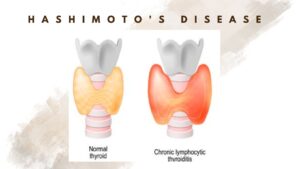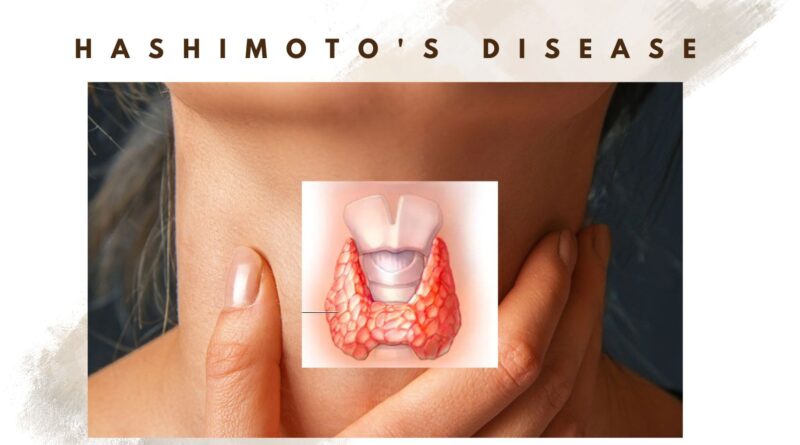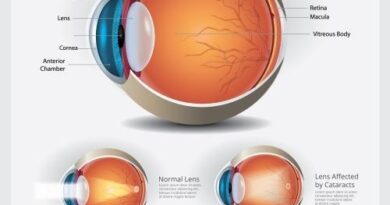Hashimoto’s Disease – a thyroid disease, how to deal with this?
What Is Hashimoto’s Disease?

Hashimoto’s disease is an autoimmune disorder that affects the thyroid gland, causing inflammation and damage to the gland and interfering with its ability to produce hormones. The most common symptoms of Hashimoto’s disease include fatigue, weight gain, depression, joint pain, and dry skin.
Here are some ways to deal with Hashimoto’s disease:
- Follow a thyroid-healthy diet: A well-balanced diet can help to support thyroid health. You should focus on eating nutrient-dense foods, such as fruits, vegetables, whole grains, lean protein, and healthy fats.
- Take medication as prescribed: Hashimoto’s disease is treated with thyroid hormone replacement therapy. It is important to take your medication as prescribed by your doctor to help regulate your thyroid hormone levels.
- Manage stress: Stress can have a negative impact on your immune system, and may exacerbate symptoms of Hashimoto’s disease. Finding ways to manage stress, such as through exercise, meditation, or therapy, can help to alleviate symptoms.
- Get enough sleep: Getting enough restful sleep is essential for maintaining overall health, and it can also help to regulate your hormone levels.
- Stay active: Regular exercise can help to improve your overall health and wellbeing, as well as reduce symptoms of depression and anxiety.
- Work with your doctor: Hashimoto’s disease is a complex condition that requires ongoing management. Working closely with your doctor can help you to develop a treatment plan that is tailored to your specific needs.
Remember that Hashimoto’s disease is a chronic condition that requires ongoing management. By making lifestyle changes and working with your healthcare team, you can effectively manage your symptoms and improve your overall quality of life.
What happens when a person gets Hashimoto’s?
When a person gets Hashimoto’s disease, their immune system attacks the thyroid gland, which is a small butterfly-shaped gland located in the neck that produces hormones that regulate metabolism.
The immune system mistakenly identifies the thyroid gland as a foreign invader and attacks it, causing inflammation and damage to the gland. Over time, this can lead to a decrease in the production of thyroid hormones, which can cause a variety of symptoms and health problems.
Some of the most common symptoms of Hashimoto’s disease include
- fatigue,
- weight gain,
- depression,
- joint pain,
- dry skin.
Other symptoms can include
- constipation,
- sensitivity to cold,
- hair loss,
- irregular menstrual cycles.
In some cases, Hashimoto’s disease can also lead to an enlarged thyroid gland, or goiter.
If left untreated, Hashimoto’s disease can cause long-term complications such as hypothyroidism, anemia, and nerve damage. In rare cases, it can also lead to thyroid cancer.
However, with proper treatment and management, many people with Hashimoto’s disease are able to live healthy, active lives. Treatment typically involves hormone replacement therapy to help regulate thyroid hormone levels and manage symptoms. It is important for individuals with Hashimoto’s disease to work closely with their healthcare team to develop a treatment plan that is tailored to their specific needs.
What is the main cause of Hashimoto’s disease?
The exact cause of Hashimoto’s disease is not fully understood, but it is believed to be a combination of genetic and environmental factors. Research suggests that certain genes may make a person more susceptible to developing autoimmune diseases, including Hashimoto’s disease. However, it is likely that other factors, such as exposure to environmental toxins, viral infections, and certain medications, may trigger the onset of the disease in susceptible individuals.
In Hashimoto’s disease, the immune system mistakenly attacks the thyroid gland, causing inflammation and damage to the gland. This can lead to a decrease in the production of thyroid hormones, which can cause a variety of symptoms and health problems. The exact reason why the immune system targets the thyroid gland in people with Hashimoto’s disease is not known, but it is thought to be related to a breakdown in the immune system’s ability to recognize the body’s own tissues as “self.”
While the exact cause of Hashimoto’s disease is not fully understood, it is clear that it is a complex condition that requires ongoing management. Treatment typically involves hormone replacement therapy to help regulate thyroid hormone levels and manage symptoms. It is important for individuals with Hashimoto’s disease to work closely with their healthcare team to develop a treatment plan that is tailored to their specific needs.
Is Hashimoto’s disease serious?
Hashimoto’s disease can be a serious condition if left untreated or poorly managed. Over time, the damage caused by the immune system’s attack on the thyroid gland can lead to a decrease in the production of thyroid hormones, which can cause a variety of symptoms and health problems.
If left untreated, Hashimoto’s disease can lead to long-term complications such as hypothyroidism, anemia, and nerve damage. In rare cases, it can also lead to thyroid cancer. Additionally, people with Hashimoto’s disease may be at increased risk for other autoimmune diseases, such as type 1 diabetes, rheumatoid arthritis, and lupus.
Treatment typically involves hormone replacement therapy to help regulate thyroid hormone levels and manage symptoms. It is important for individuals with Hashimoto’s disease to consult their doctor regularly. Most people with Hashimoto’s disease are able to maintain good health and prevent complications.
Can Hashimoto’s disease be cured?
Its a chronic disease , so there is currently no cure for Hashimoto’s disease. However, with proper treatment and management, many people with Hashimoto’s disease are able to live healthy, active lives. Treatment typically involves hormone replacement therapy to help regulate thyroid hormone levels and manage symptoms.
In some cases, lifestyle changes such as a healthy diet, regular exercise, stress management, and getting enough sleep is also helpful.
Can Hashimoto’s disease cause Hyperthyroidism ?
Yes in 20% of cases Hashimoto’s disease typically leads to hypothyroidism, which is a condition where the thyroid gland does not produce enough thyroid hormones. However, in some rare cases, Hashimoto’s disease can cause hyperthyroidism, which is a condition where the thyroid gland produces too much thyroid hormone.
In these cases, the immune system’s attack on the thyroid gland can cause damage that leads to a sudden release of thyroid hormone into the bloodstream, resulting in hyperthyroidism. This is known as Hashitoxicosis or Hashimoto’s thyroiditis with transient hyperthyroidism. The symptoms of hyperthyroidism can include weight loss, tremors, anxiety, and an irregular heartbeat, among others.
While this is a rare occurrence, it is important for individuals with Hashimoto’s disease to be aware of the possibility of developing hyperthyroidism, especially if they experience symptoms such as unexplained weight loss, tremors, or heart palpitations. In these cases, it is important to speak with a healthcare provider to determine the underlying cause of these symptoms and to develop an appropriate treatment plan.
How is Hashimoto’s diagnosed?
Hashimoto’s disease is typically diagnosed through a combination of physical exams, medical history, and laboratory tests.
During a physical exam, examination of the thyroid gland for signs of enlargement, tenderness, or nodules. Also check for other symptoms associated with Hashimoto’s disease, such as dry skin, hair loss, or joint pain.
Medical history will be taken to understand if there is a family history of autoimmune disorders, any exposure to radiation or other environmental toxins, any history of thyroid disorders, or any medications that could have an effect on the thyroid gland.
The laboratory tests usually include a blood test to measure the levels of thyroid hormones (T3, T4), thyroid-stimulating hormone (TSH), and antithyroid antibodies such as thyroid peroxidase antibodies (TPO) and thyroglobulin antibodies (TgAb). Elevated levels of antithyroid antibodies along with abnormal thyroid hormone levels in the blood can suggest a diagnosis of Hashimoto’s disease.
In some cases, an ultrasound of the thyroid gland may be performed to detect any nodules or abnormalities in the gland.
It is important for individuals who suspect that they may have Hashimoto’s disease to seek medical evaluation and consult your doctor. Early detection and treatment of Hashimoto’s disease can help to prevent complications.
What is the difference between Hashimoto’s and hypothyroidism?
Hashimoto’s disease and hypothyroidism are related conditions, but they are not the same thing.
Hashimoto’s disease is an autoimmune disorder in which the immune system attacks the thyroid gland, leading to inflammation and damage to the gland. This can eventually lead to a decrease in the production of thyroid hormones, which are responsible for regulating the body’s metabolism. Hashimoto’s disease is the most common cause of hypothyroidism in the United States.
Hypothyroidism, on the other hand, is a condition in which the thyroid gland does not produce enough thyroid hormones. This can be caused by a variety of factors, including Hashimoto’s disease, but it can also be caused by other conditions or treatments that affect the thyroid gland.
The symptoms of Hashimoto’s disease and hypothyroidism can be similar and can include fatigue, weight gain, depression, joint pain, and dry skin, among others. However, Hashimoto’s disease is specifically caused by the autoimmune attack on the thyroid gland, whereas hypothyroidism can have a variety of causes.
It is important for individuals who are experiencing symptoms of Hashimoto’s disease or hypothyroidism to seek medical evaluation and treatment from a healthcare provider. Treatment for hypothyroidism typically involves hormone replacement therapy to help regulate thyroid hormone levels and manage symptoms. Treatment for Hashimoto’s disease may also involve hormone replacement therapy, as well as management of the underlying autoimmune disorder.
Complications of Hashimoto’s Disease
Hashimoto’s disease can lead to a number of complications, particularly if left untreated or poorly managed. Some of the most common complications of Hashimoto’s disease include:
- Hypothyroidism: Hashimoto’s disease is the most common cause of hypothyroidism, a condition in which the thyroid gland does not produce enough thyroid hormones. Hypothyroidism can cause a range of symptoms, including fatigue, weight gain, depression, and constipation.
- Goiter: In some cases, the thyroid gland may become enlarged due to inflammation and damage caused by Hashimoto’s disease. This can lead to a visible swelling in the neck called a goiter.
- Myxedema: In severe cases of untreated hypothyroidism, a life-threatening condition called myxedema can occur. This can cause symptoms such as extreme fatigue, confusion, and even coma.
- Cardiovascular disease: Hypothyroidism can increase the risk of cardiovascular disease, including high blood pressure, high cholesterol, and heart disease.
- Infertility: In some cases, Hashimoto’s disease can affect fertility in both men and women.
- Birth defects: Women with untreated hypothyroidism during pregnancy have an increased risk of miscarriage, stillbirth, and birth defects in their babies.
- Thyroid lymphoma: In rare cases, Hashimoto’s disease can increase the risk of developing thyroid lymphoma, a type of cancer that affects the thyroid gland.
It is important for individuals with Hashimoto’s disease to work closely with their healthcare team to manage the condition and prevent complications. This may involve regular monitoring of thyroid hormone levels, medication management, and lifestyle changes such as a healthy diet and regular exercise.
Conclusion:-
In conclusion, Hashimoto’s disease is an autoimmune disorder that affects the thyroid gland, leading to inflammation and damage to the gland. This can eventually lead to a decrease in the production of thyroid hormones, which are responsible for regulating the body’s metabolism. Hashimoto’s disease is the most common cause of hypothyroidism in the United States. Symptoms of Hashimoto’s disease can include fatigue, weight gain, depression, joint pain, and dry skin, among others. Treatment for Hashimoto’s disease typically involves hormone replacement therapy to help regulate thyroid hormone levels and manage symptoms, as well as management of the underlying autoimmune disorder. It is important for individuals who suspect that they may have Hashimoto’s disease to seek medical evaluation and diagnosis from a healthcare provider in order to prevent complications and improve overall health outcomes.





